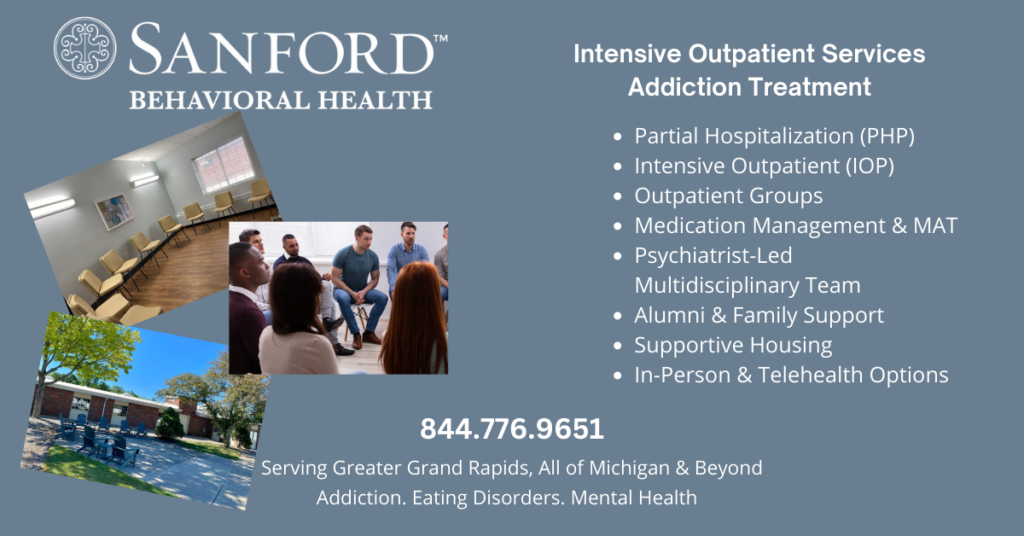Intensive Outpatient Programs – Tips for Staying on Track

There is a built-in community of like-minded individuals in IOP groups at Sanford Behavioral Health.
Outpatient addiction treatment at Sanford Behavioral Health gives individuals the support they need while maintaining daily responsibilities and routines. Sanford West Behavioral Health Campus outpatient center offers individualized addiction recovery programs that work in “real life.” When entering a Sanford program, each person is assessed to determine their appropriate placement; the goal is to select a clinically relevant program in the least restrictive level of care.
What is an Intensive Outpatient Program for Addiction Treatment?
You will hear the acronyms IOP and PHP as you navigate the resources available. You will also hear terms like outpatient, telehealth, virtual treatment, and day and half-day programs. There are many options for treatment that do not require you to move into a residential facility for weeks or months. Intensive outpatient programs (IOP) are designed for those who do not need 24-hour supervision or medical detox or are transitioning from a residential program. They offer group, individual, and family therapy and establish coping tools and long-term relapse prevention strategies. At Sanford, a psychiatrist-led interdisciplinary team backs all of our programs.
“Based on the quality of trials, diversity of settings, and consistency of outcomes, the level of evidence for IOP research was considered high. Multiple randomized trials and naturalistic analyses compared IOPs with inpatient or residential care; these types of services had comparable outcomes. All studies reported substantial reductions in alcohol and drug use between baseline and follow-up. However, substantial variability in the operationalization of IOPs and outcome measures was apparent.” National Institutes of Health (NIH)
Intensive Outpatient Programs (IOP)
Sanford Behavioral Health provides intensive outpatient programs to those struggling with addiction, trauma, and co-occurring mental health conditions. IOP provides structure and accountability while encouraging individuals to integrate their treatment into their personal, home, and work life. Program duration is typically 18 half-day sessions which cover approximately six weeks. Our IOP includes the following services:
- Three group therapy sessions each week
- Individual and family therapy
- Individualized treatment planning
- Diagnostic assessments
- Medication treatment and medication-assisted treatment (MAT)
- Supportive housing
- Outpatient detox withdrawal management
- Continued care for those finishing a residential program
- Flexible evening sessions for working adults and those with daytime responsibilities
- Family programs and support groups
- Aftercare and continuing care planning
Telehealth, Virtual Treatment, Online Addiction Treatment
Virtual addiction treatment, or telehealth, offers the same evidence-based practices that our in-person programs provide, but in the comfort and safety of the home. Classes are given through video chatting on either smartphones or computers. Virtual outpatient treatment is real-time with a master’s level clinician as a facilitator. Under HHS.gov guidelines, our telehealth programs are HIPAA-compliant and insurance-eligible. Our easy-to-use programs include online assessments for entrance to any of our virtual addiction treatment programs.
Tips for Staying On Track in IOP
The key to successful outcomes in IOP is based on proper assessment, the program’s quality, and the person’s ability to stay on track. With telehealth (internet chat technology) and in-person options, IOP success requires commitment from those involved. Following are tips to help you keep focused:
- Be singular about your recovery and make it your number one goal. Now is not the time to make several other life changes. Navigating recovery and maintaining other commitments at home, work, or school will be enough. Table “getting into shape” or starting a new hobby.
- Attend every IOP session, even when you do not feel like it or have to disclose difficulties or lapses.
- Work with your IOP therapist to set value-based short-term goals.
- Together with your IOP therapist, create a plan for incorporating other life activities (stressors, commitments) into your IOP schedule.
- Set aside time to decompress with mindfulness activities – breathing, stretching, and walking in nature.
- Involve your family or loved ones in the Sanford Family Program for education and support!
- If accessing IOP via telehealth, find a quiet space and a DO NOT DISTURB sign. Convenient after work or during school hours are available for IOP sessions.
- Start a journal to track your results.
- Join a community of like-minded individuals. There is a built-in community in IOP groups at Sanford; find a 12-step meeting, a sober buddy, a church group, or walking partners.
- Work with family members to create a recovery-friendly home!
Our team is here to support and guide individuals in their recovery journey, no matter where they may be in the stages of change. We offer a variety of outpatient programs to meet each individual’s needs and provide them with tools to create a substance-free life. Click the link below for information or to verify insurance.




